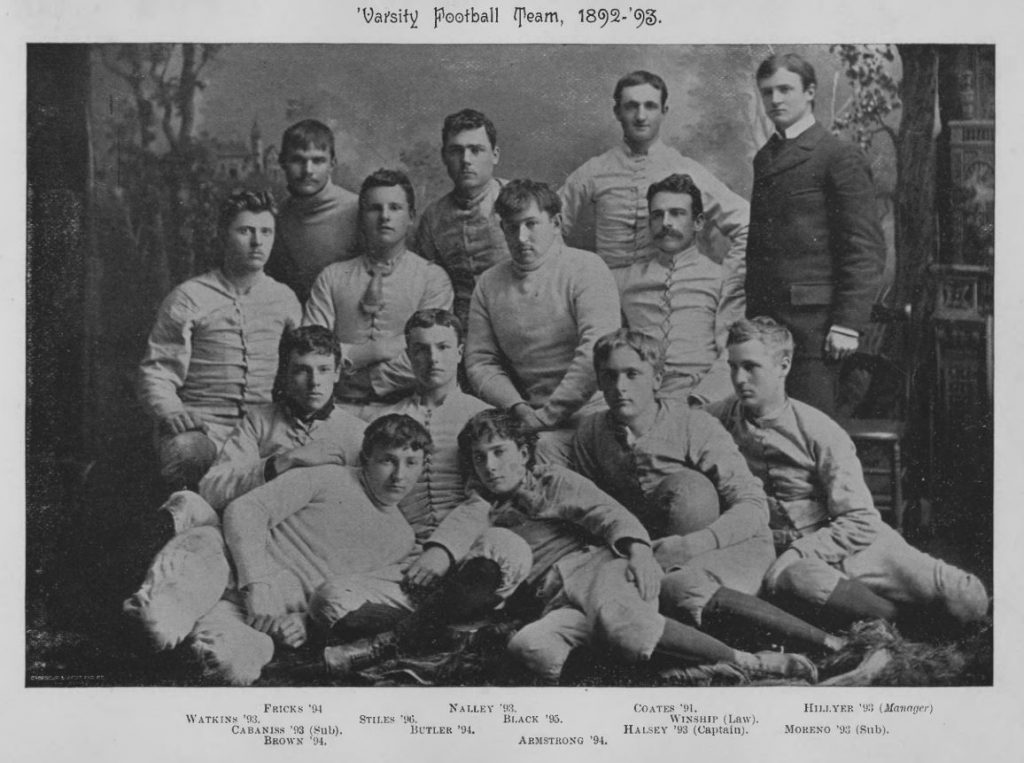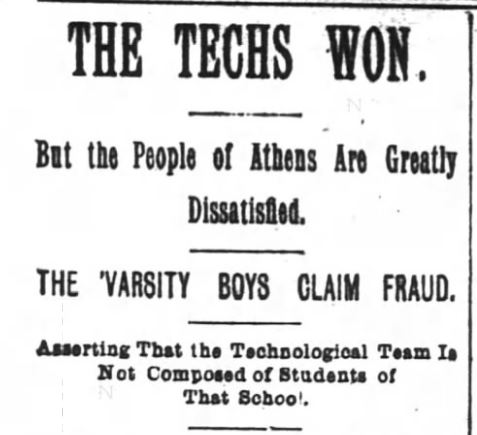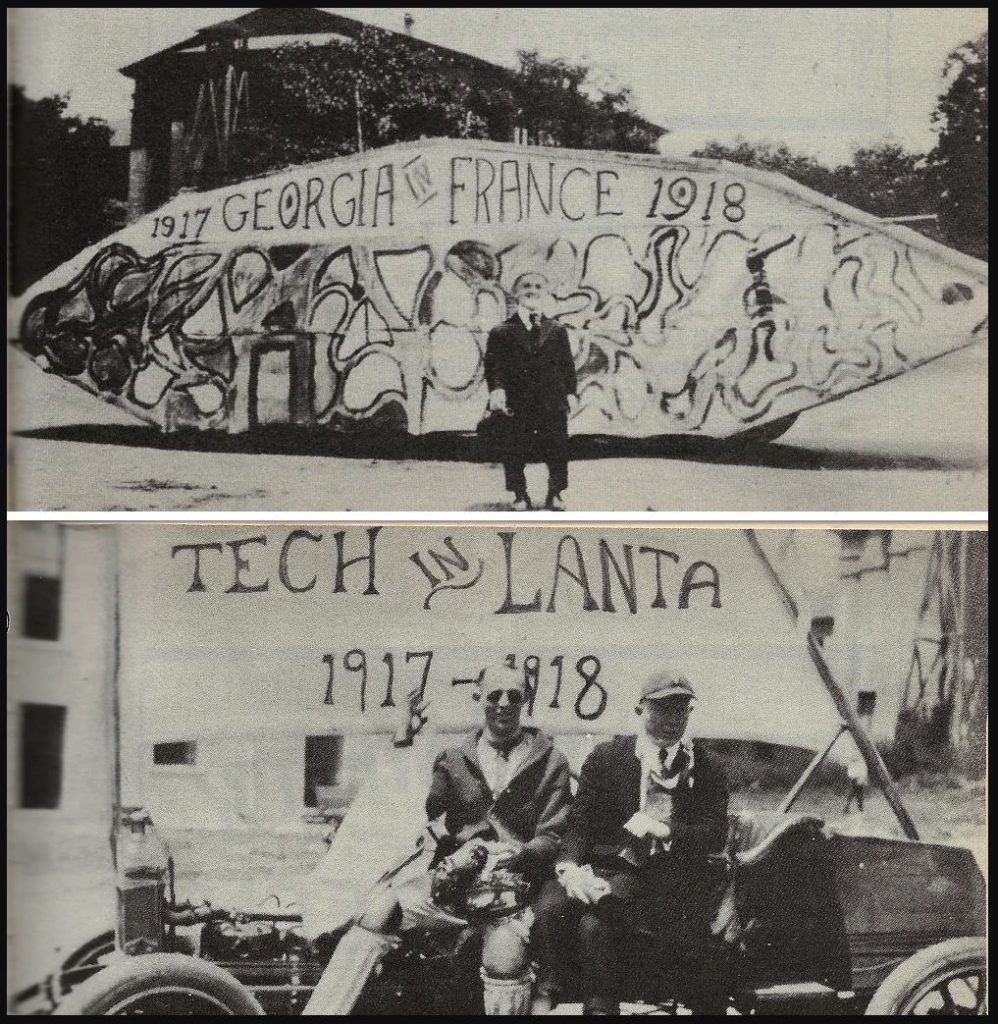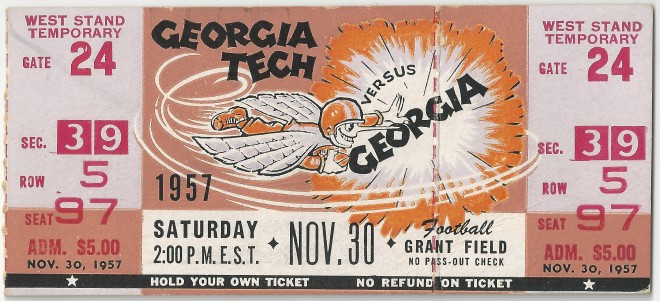In 1977, author Bill Cromartie coined arguably the best sports rivalry name of all time. A name that encompasses nearly 130 years of rampant patriotism for both Georgia and Georgia Tech, a name that describes one of the all-time greatest rivalries even if they disagree on how many games they actually played, a name that depicts a feud that started over — colors — this is “Clean Old Fashioned Hate.”
The year is 1893, and the University of Georgia “Varsity” is battling the Georgia School of Technology “Techs” for the first time on the football field. Before the teams had even arrived, however, there was controversy regarding the legitimacy of some of the Tech players.
The University of Georgia squad had accused the Techs of using players “who have been out of college for years” and stated that they were “uneasy, as they had no idea what sort of men they would have to play.” The Techs manager emphatically denied the rumors and said that each player was a “bonafide student of the school.”

Here’s the truth- the Techs did have a 28-year-old U.S Army Captain playing in the contest. However, the University of Georgia also had a paid trainer playing halfback, which was against intercollegiate rules. Which was the worse sin? I’ll let you decide.
To stoke the flames even higher, the umpire for the game was the brother to the trainer of the Tech team and made some “unfair decisions” in favor of Tech. The Athenians voiced their displeasure of those decisions with the following melody:
“Well, well, well
Who can tell,
The Tech’s umpire has cheated like —”
The score wasn’t close. Tech dominated 28-6. The team retired to the train station dodging insults and rocks thrown their way by the Georgia faithful, only to have their train crash on the return trip to Atlanta. Thankfully, no one was seriously injured.

The Georgia School of Technology officially adopted “old gold” and white as the school’s colors in 1893, which was a direct shot at the University of Georgia. Two years prior, in 1891, a literary magazine at the University of Georgia declared the official colors “old gold, black, and crimson.”
However, Dr. Charles H. Herty, the first football coach of the university, mistook the gold hues on the magazine’s cover as the color yellow, and proclaiming that yellow was “cowardly” stated that it should not be associated with Georgia athletics, leaving the school with crimson and black as the official colors. During that first meeting on the gridiron, over 200 students from nearby Lucy Cobb Institute attended the game to cheer on Tech while wearing old gold and white clothing. They witnessed Tech beat Georgia with those same “cowardly” colors that Dr. Herty had rejected just two years earlier. This along with the controversy of that first meeting laid the groundwork for this ancient rivalry.
In 1919, things got personal. During the Senior Parade in Athens, a parade float in the shape of a tank cruised down the road sporting a sign that read, “1917 GEORGIA IN FRANCE 1918.” This represented how Georgia’s male population was off fighting in the war. The float directly behind this was a Model T Ford displaying a sign that read, ” TECH IN ‘LANTA 1917-1918,” implying that Georgia Tech stayed home to play football (They do claim the 1917 national championship).
Georgia Tech’s athletic director J.B. Crenshaw was livid. He demanded an apology from Georgia’s senior class. And when he didn’t get it, he canceled all sporting events between the two schools effective immediately. It would not be until six years later, in 1925, that the two schools would compete against one another in any athletic event.

The Bulldogs and Yellow Jackets agree that they hate each other— however— they cannot agree on how many times they actually played each other.
The seasons in question are 1943 and 1944 during World War II. Because of the war, all of Georgia’s able-bodied men were gone. They were left with students younger than 18 or who were unfit for military service.
On the other hand, Georgia Tech was selected by the Navy for the V-12 program and had plenty of players, some of them even being captains from other SEC schools. Tech trounced the Bulldogs in both seasons, 48-0 and 44-0, respectively.
The disagreement began in 1949 when Georgia hired the late Dan Magill as sports information director. Magill informed head coach Wally Butts that those two games would no longer be counted in the series record.
His reasoning? “Those were not true Georgia Tech teams,” he said. “There’s no question about it, there’s no way they are true Georgia-Georgia Tech games.”
Let’s put those years into context. Georgia was pretty good, going 13-7, and had earned a #20 ranking in the AP poll during the two-year stretch. Those thirteen wins are still counted in the Georgia record books. In addition to this, Coach Butts had called a team meeting before the season to ask if the players wanted to participate at all, saying, “I asked [the 1943 team] frankly if they wanted to pay the price in defeats they’ll have to take.” They said yes.
Nevertheless, according to Georgia, the asterisks still stand, and the all-time series record to them is 69-39-5. Meanwhile, the books for Georgia Tech say 41-69-5. The NCAA and SEC recognize these two games, and they are even included in the final win-loss record recognized by Georgia.
The University of Georgia has dominated this rivalry in recent years. In the last twenty years of competition in football, the Bulldogs hold a 17-3 record against the Yellow Jackets. Their latest meeting was a 45-0 shutout by Georgia.
But, no matter their record or the sport, the emotions are immense whenever these programs face each other.
If you are looking for an example of how intense this rivalry is, let me direct your attention to the lyrics of Georgia Tech’s “Up with the White and Gold.”
“Oh well it’s up with the White and Gold
Down with the Red and Black
Georgia Tech is out for the victory
We’ll drop the battle-ax on Georgia’s head.”
Now that’s “Clean Old Fashioned Hate.”






